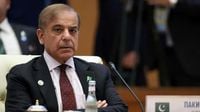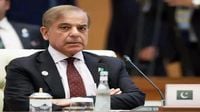NEW DELHI: On May 9, 2025, India's executive director at the International Monetary Fund (IMF) is set to present the country's position regarding a proposed $1.3 billion loan to Pakistan during a board meeting of the multilateral agency. This meeting comes as tensions between the two neighboring countries escalate following India's recent military operations.
Foreign Secretary Vikram Misri confirmed in a press conference that India would voice its concerns about the loan, which is aimed at supporting Pakistan's economy amid ongoing financial turmoil. "We have an executive director at the IMF, and I'm sure that our executive director will put forward India's position," Misri stated. The IMF board is expected to review Pakistan’s request for the loan, which is part of a larger funding arrangement.
Pakistan's government has been struggling with a severe economic crisis, having secured a $7 billion bailout from the IMF last year and a new $1.3 billion climate resilience loan in March 2025. The current meeting marks Pakistan's 24th IMF program, and the stakes are high as the country seeks to stabilize its economy.
Misri emphasized that the IMF board members should consider the historical context of Pakistan's previous bailout programs, noting that many have failed to achieve successful outcomes. "I think the case with regard to Pakistan should be self-evident to those people who generously open their pockets to bail out this country. Many IMF bailout programs have been sanctioned in the space of the last three decades, but how many of those programs have actually reached a successful conclusion? Probably not many," he remarked.
Pakistan's Economic Affairs Division has publicly acknowledged the dire state of its economy, urging international partners for additional loans following heavy losses attributed to escalating conflict with India. In a statement, they said, "Amid escalating war and stocks crash, we urge international partners to help de-escalate. Nation urged to remain steadfast." This appeal for support comes on the heels of a stock market crash and rising tensions that have left the nation vulnerable.
Adding to the complexity, Pakistan's Ministry of Economic Affairs claimed that its official X (formerly Twitter) account was hacked after a post appeared seeking loans from international partners. The ministry clarified that they had not made the post, which read: "Govt of Pakistan appeals to International Partners for more loans after heavy losses inflicted by enemy. Amid escalating war and stocks crash, we urge international partners to help de-escalate." This incident has raised eyebrows and led to further scrutiny of Pakistan's financial requests.
In the backdrop of these economic challenges, Operation Sindoor, executed by India on May 7, 2025, targeted nine terror infrastructures in Pakistan and Pakistan-occupied Kashmir (PoK). This military operation was a direct response to the Pahalgam terror attack on April 22, which resulted in the deaths of 26 civilians. Misri pointed out that IMF loans to Pakistan have been indirectly funding military intelligence operations, suggesting that these funds could be used to support cross-border terrorism activities against India.
"Pakistan's reputation as the epicenter of global terrorism is rooted in a number of instances. I don't need to remind you where Osama Bin Laden was found and who called him a martyr," Misri stated, emphasizing the need for caution among IMF board members when considering the loan.
As the IMF meeting unfolds, the international community watches closely. India is expected to vote against the aid package for Pakistan, reflecting the ongoing hostilities and India's concerns over terrorism. Misri's comments indicate that India's position will be firmly articulated, urging the IMF to reconsider its financial assistance to Pakistan.
Pakistan's forex reserves have dwindled to approximately $15 billion, and with the country being the IMF's fourth-largest debtor, the pressure is mounting. The IMF's decision on the loan could have significant implications for Pakistan's economic stability and its ability to navigate the current crisis.
Amid these developments, the U.S. State Department has called for restraint from both India and Pakistan. Secretary of State Marco Rubio has emphasized the need for immediate de-escalation and has reached out to leaders from both countries, urging dialogue to resolve tensions. The U.S. remains committed to supporting India in its fight against terrorism, while also advocating for a peaceful resolution to the ongoing conflict.
As tensions continue to rise, the question remains: will the IMF proceed with the loan to Pakistan despite India's objections and the complex geopolitical landscape? The outcome of today's meeting will undoubtedly shape the future of Pakistan's economy and its relationship with the international community.
In conclusion, the situation is precarious, and the IMF's decision could either provide a lifeline to Pakistan or exacerbate the existing tensions between the two nations. The world is watching closely as this critical meeting unfolds.





